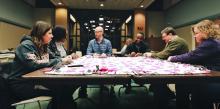Historia de Terry Forde
Las puertas del elevador se estaban empezando a cerrar cuando entré al vestíbulo de un edificio de oficinas. Podía ver la cara del joven mensajero que estaba llevando un paquete mientras las puertas se cerraban; cuando alzó la mirada y me vio, instintivamente puso su pie entre las puertas y evitó que se cerraran.








